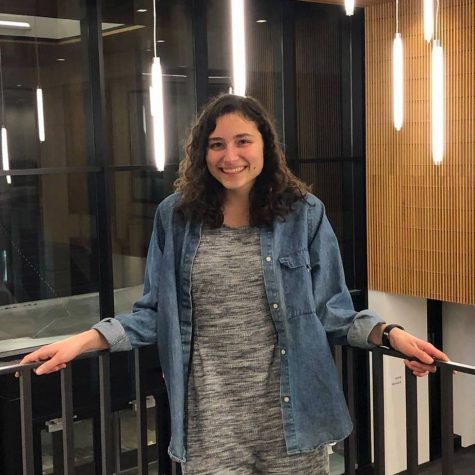FFM sends divestment petition and proposal to Rivera, Board of Trustees
February 25, 2021
On Feb. 15, former Fossil Free Mac (FFM) members Sasha Lewis-Norelle ’21 and Emma Harrison ’21 submitted a new divestment proposal to President Suzanne Rivera and the Macalester Board of Trustees. The proposal comes in light of information that Macalester is invested in Enbridge Energy, the company behind the Line 3 pipeline.
Their proposal contained three key demands for the Board: denouncing Line 3, divesting from all liquid holdings in Enbridge Energy and creating a more open dialogue with the Macalester community about the endowment.
After Harrison and Lewis-Norelle submitted their proposal, they utilized FFM’s social media following to circulate a petition for Macalester community members to sign. As of Feb. 24, 430 people, including faculty, staff, alumni and students signed the petition.
The petition contained a shortened version of their proposal demands and urged immediate action from the board and President Rivera.
“While the college will want this proposal reviewed first by the Social Responsibility Committee (SRC), there is no time for a lengthy bureaucratic process,” the petition reads. “The Board of Trustees must take immediate action.”
Macalester’s guidelines for investor responsibility from December 2018 require divestment proposals to first seek approval from a campus Social Responsibility Committee (SRC). When FFM submitted a divestment proposal in 2018, it took the SRC four months to send the proposal to the board of trustees. In their petition, Harris and Lewis-Norelle explain that four months from now, Line 3 will be nearing completion.
On Feb. 22, President Rivera announced in the Mac Daily that a new SRC will convene to review the proposal. Environmental studies department chair and professor Roopali Phadke will chair the committee. Three MCSG student representatives, including sustainability officer Kashvi Ajitsaria ’22, will serve, along with Director of Sustainability Christie Manning and four other faculty and staff. Chief Investment Officer Gary Martin, Vice President of Administration and Finance David Weaton and Associate Dean of Students Andrew Wells will be on the committee as non-voting members.
Phadke said that the committee plans to meet for the first time in the next two weeks, with the goal of completing their review of the proposal by mid-May.
“We are trying to complete our work by the end of this academic year so we are getting to work as fast as we can,” Phadke wrote in an email to The Mac Weekly.
This is a longer process than the immediate consideration that the proposal asks for. According to an Enbridge spokesperson, the company plans to complete the pipeline by August, nine months after construction began last fall.
Per the guidelines cited by Rivera, the proposal will not go before the board until the SRC reviews it. The SRC’s recommendation will depend on whether voting members believe the Macalester investment in Enbridge causes “grave social injury” as defined in the guidelines.
Chair of the Board of Trustees Jerry Crawford said that the Board plans to follow its guidelines and timeline for considering this proposal.
“We will follow our Board approved procedure and look forward to receiving a recommendation,” Crawford wrote in an email to The Mac Weekly. “I will notify the Board that we have received a proposal and that it has been sent to the SRC for their review.”
After the SRC makes their recommendation to Rivera, she will review the proposal and decide whether it should move to the board. The timeline is uncertain, and there is no set limit for how long the SRC, Rivera or the board can contemplate their decisions. The guidelines also state that the board may create an ad hoc committee to consider the proposal prior to a full vote.
FFM’s first proposal went before the SRC in February 2018. The board ultimately voted on it — over a year later — in October 2019.
The Macalester College Student Government (MCSG) has also lent their support to the new divestment movement. On Feb. 16, the Legislative Body (LB) discussed the proposal after a presentation by Ajitsaria. Ajitsaria asked MCSG to consider further supporting climate justice work on campus, including asking for full divestment from all fossil fuel securities and supporting the Sustainability Office’s environmental justice work.
At their meeting on Feb. 23, the LB voted to send a letter of support for the proposal to The Mac Weekly and to President Rivera.
The proposal features statements from students, faculty, staff and alumni in order to lay out their case that the pipeline causes harm. Many of these statements touch on the fossil fuel emissions already increasing as a result of pipeline construction as well as the desecration of Indigenous sacred sites and treaty land.
“It is hypocritical of Macalester to market itself as a school for ‘agents of change’ while simultaneously using its wealth to aid in the desecration of sacred sites, the polluting of our water, and the harm to countless Indigenous relatives,” reads Andrew Lee’s ’23 statement.
“Maintaining investments in Enbridge Energy, a fossil fuel corporation currently bulldozing the sacred treaty territory of the Anishinaabe people to construct a tar sands oil pipeline that would have the climate impact equivalent to 50 new coal plants, aligns Macalester not with positive social change but with the continued colonial extraction and climate denial that undergird the Line 3 pipeline,” reads a portion of Akilah Sanders-Reed’s ’16 statement.















